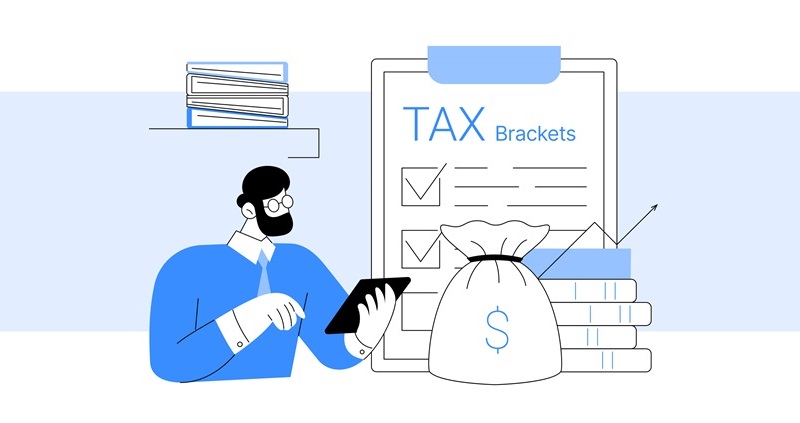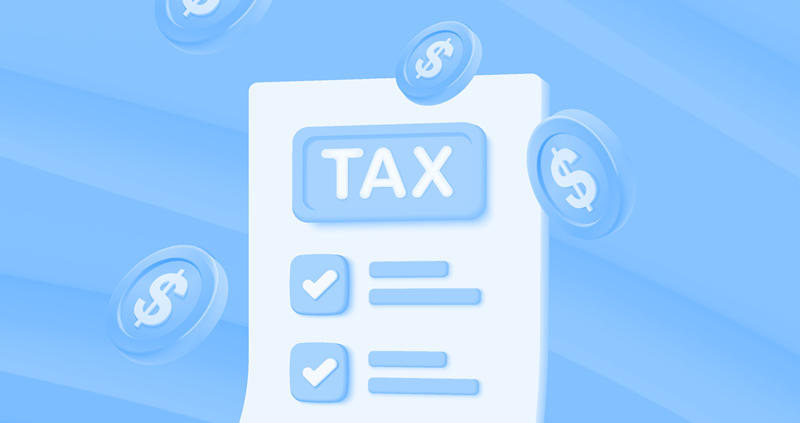What states have no income tax in 2025?
Which states skip personal income tax, and how do they compare?
Tax-free states: There are nine U.S. states with no income tax in 2025, including Florida, New Hampshire, and Tennessee.
Other taxes apply: States that don't have income tax may compensate for this by imposing higher sales or property taxes, so the overall tax burden may still be substantial.
Living costs: Not paying income tax doesn’t always mean cheaper living: other costs can vary widely by state.
What are the states with no income tax?
As of 2025, these nine states do not impose any state income tax on earned income:
Alaska
Florida
Nevada
New Hampshire
South Dakota
Tennessee
Texas
Washington
Wyoming
Lists of tax-free states sometimes omit Washington. This is because a capital gains tax has applied to high-income investors in the state since 2022. However, there isn’t a personal income tax, so it doesn’t tax wages.
Why don’t these states tax income?
Each of the nine income-tax-free states has a different reason for not taxing personal individual income. Let’s look at some of the reasons in each state, and how residents may be affected by other taxes.
Alaska — Resource wealth. As Alaska relies heavily on oil and natural gas revenue, the state collects royalties from energy production and distributes part of the profits directly to residents.
Florida — Constitutional prohibition. Florida’s state constitution bans personal income taxes, and the state already generates significant revenue through tourism-driven sales taxes and property taxes.
Nevada — Tourism and gambling revenue. Nevada generates a significant portion of its state revenue from casinos, entertainment, and tourism-related businesses, and this is combined with relatively high sales and business taxes.
New Hampshire — Tradition. Historically, New Hampshire has avoided broad-based taxes, such as sales and income taxes, instead funding state operations through property taxes and business taxes.
South Dakota — Business-friendly tax structure. South Dakota employs a low-tax model, focusing on sales taxes and taxes on businesses, including a bank franchise tax.
Tennessee — Recent policy shift. Tennessee relies heavily on high sales taxes and fees, and it eliminated its tax on interest and dividends in 2021, making the state fully income-tax-free.
Texas — Constitutional ban. Like Florida, Texas’s constitution prohibits personal income tax, with the state relying heavily on property taxes, sales taxes, and oil and gas revenues.
Washington — Consumption-based revenue model. Washington funds its public services through sales taxes, business taxes, and selective excise taxes. Strictly speaking, Washington is not an entirely tax-free state, as it does tax capital gains income for certain individuals.
Wyoming — Energy-driven revenue. Wyoming benefits from coal, oil, and natural gas production, which provide significant state revenue. With a low population and severance taxes from resource extraction, Wyoming can maintain its services without needing a state income tax.
Pros and cons of living in states with no income tax
Living in a state with no income tax can be financially advantageous, especially for savers and retirees, but there may be trade-offs.
Pros
More take-home pay: Of course, the main advantage is that your wages aren’t taxed, so you keep more of each paycheck (which may amount to thousands of dollars annually). This can have a significant impact on high earners, freelancers, or remote workers relocating from other states, as well as dual-income households aiming to maximize disposable income.
Tax-free retirement income withdrawals: States with no income tax typically don’t tax withdrawals from retirement accounts, including traditional IRAs, Roth IRAs, 401(k)s, pension and annuity income, as well as Social Security benefits. This can be a major advantage for retirees or anyone who is actively planning for retirement.
Easier tax filing: Without state income tax, there’s no need to file a state tax return, so you can save both time and money on tax preparation, with less paperwork and fewer chances for errors. This might be especially appealing for small business owners or anyone with multiple income streams.
Cons
Higher sales, property, or capital gains taxes: States that don't have income tax still need revenue, and if they don’t tax personal income, they will need to raise it elsewhere. For example, Tennessee and Nevada have high sales tax rates (sometimes exceeding 9% when local taxes are included), while Texas and New Hampshire are known for their high effective property tax rates, which exceed 2% in some areas. Meanwhile, Washington levies a 7% long-term capital gains tax on high-income investors who earn over $250,000 annually, but does not tax wages or salaries.
Variable cost of living: Some states with no income tax have high housing prices or living costs that can eat into your income. Washington and Nevada have expensive metro areas, like Seattle and Las Vegas, while Florida and New Hampshire generally have high housing and real estate costs. This means that even without income tax, the total cost of living can be comparable to other states.
Variable public services and infrastructure: Income-tax-free states may have less to invest in services, including schools, roads and transport, and offer fewer social programs or public health services. This may not matter to everyone, but it may be worth considering if you have children, or rely on public healthcare or transportation.
Comparison of states with no income tax
State | Income tax on wages | Sales tax | Effective property tax rate¹ | Capital gains/dividends tax | Relative cost of living | Ideal for |
Alaska | 0% | 0% (some local) | 1.07% | None | Moderate-High | Retirees or remote workers drawn to a rural lifestyle |
Florida | 0% | 6% | 0.71% | None | Moderate | Retirees seeking tax-efficient retirement income and warm climate |
Nevada | 0% | 6.85% | 0.44% | None | Moderate-High (esp. Las Vegas) | Entrepreneurs, retirees, and remote workers favoring low property tax |
New Hampshire | 0% | 0% | 1.61% | None (dividend and interest tax fully repealed in 2025) | Moderate-High | Investors and retirement savers who value no sales tax |
South Dakota | 0% | 4.20% | 1.01% | None | Low-Moderate | Business owners and retirees seeking affordable living |
Tennessee | 0% | 7% | 0.48% | None | Low-Moderate | Retirees and those seeking affordable living with low property taxes |
Texas | 0% | 6.25% | 1.47% | None | Varies (Moderate to high in metro area) | High earners and remote professionals |
Washington | 0% | 6.5% | 0.76% | Capital gains tax applies | High (esp. Seattle) | Tech professionals and high-income investors |
Wyoming | 0% | 4% | 0.55% | None | Low-Moderate | Investors, retirees, and small businesses |
Sales and property tax figures are approximate 2025 state averages from Tax Foundation; actual local rates vary by county or municipality.
Learn more about the best states to retire for tax reasons.
Making the most of living in a no-income-tax state
Living in one of the states that doesn’t have income tax can offer big financial advantages, as explored above. However, it also requires smart planning to maximize those benefits, as well as weighing up what matters most to you. You could think about:
What is the local interest rate environment? Rates on savings products can vary a lot by region, depending on local economic conditions and market competition. If this is important to you — for example, if you’ll be relying on interest income, or looking to save for a long-term goal like retirement, it’s worth comparing what’s available from local banks or credit unions in your state. To grow your savings, consider taking advantage of high-yield savings accounts and CDs (certificates of deposit) offered through Raisin’s U.S. partner banks and credit unions.
- How are taxes treated outside of income? Some states, like New Hampshire, recently repealed taxes on interest and dividends. While the repeal is in effect now, lawmakers occasionally propose changes, so it’s worth keeping an eye on local tax updates.
What is your overall tax burden? Personal income tax is only part of the story. Many of the no-income-tax states offset “lost” revenue through other means, like sales, property, and excise taxes. So, even if you’re saving on income tax, your overall tax burden may not be as low as expected. It’s crucial to weigh this up when deciding where to live or retire.
Explore local perks — some states offer exclusive benefits or financial incentives for residents, including property tax breaks and utility credits.
Living in a state with no income tax can be a smart move for savers, especially those with significant income or retirement provisions. But tax savings aren’t the full picture. That’s why it’s essential to look beyond income tax alone and evaluate your total cost of living (including taxes, housing, and daily expenses) to make a fully informed decision.
Wherever you live, by pairing tax-smart strategies with tools like high-yield savings accounts, state-level benefits, and smart budgeting, you can make the most of your financial circumstances.
The above article is intended to provide generalized financial information designed to educate a broad segment of the public; it does not give personalized tax, investment, legal, or other business and professional advice. Before taking any action, you should always seek the assistance of a professional who knows your particular situation for advice on taxes, your investments, the law, or any other business and professional matters that affect you and/or your business.
Sources
¹Sales and property tax rates by state: https://taxfoundation.org/location/alaska/ et al


